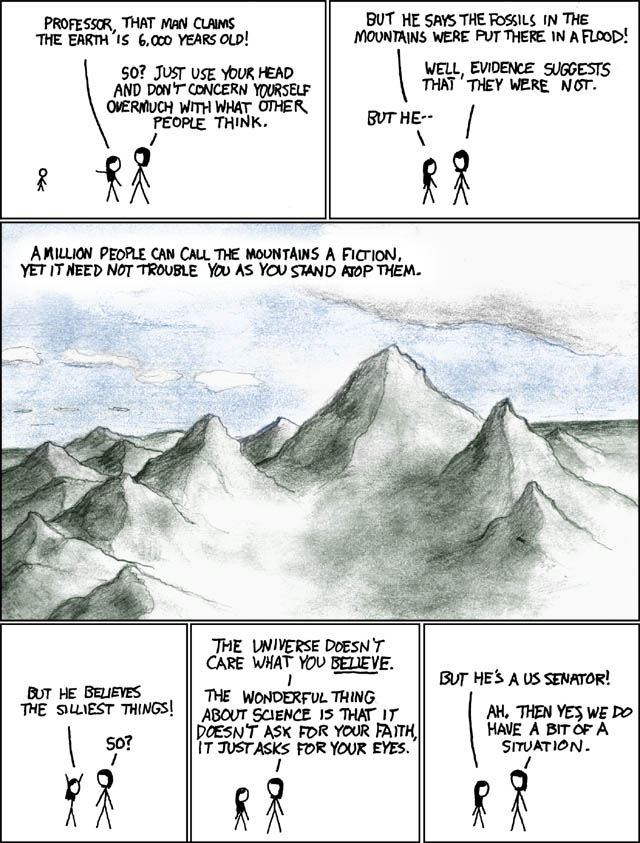It's something of a point of pride that I don't wish this blog to descend into a polemic. In that spirit, here are several links to some interesting articles regardless of whether I support the views of the author (or subject) or not.
Note the seamless transitions...
<winks eyebrows>
1)
Letters to a heretic: An email conversation with climate change sceptic Freeman Dyson. The science editor of
The Independent, Steve O'Connor, sets out to establish why eminent physicist Freeman Dyson remains one of the (apparently) few high-profile scientists not to endorse the mainstream theory on anthropogenic global warming. For me, this is ultimately a very disappointing conversation which degenerates into an abrupt (non) conclusion. As usual, both sides are claiming victory against the other as a result. My own feeling is that nothing was gained and I left
two comments to this effect, including a link to a superior article on Dyson, as well as some information for those whining about use of the word "heretic". [Note: While I do regard Dyson as ultimately being at fault for pulling the plug on interview, I think that O'Connor's line of questioning became increasingly poor as the interview went on. With Dyson getting tetchy, why not engage him on the specific issues surrounding the use of computer models? How are people improving them and what makes him confident that they are
overstating the role of carbon when the models have proved to be accurate - or, if anything, overoptimistic - until this point?]
Seeing as we're on the subject of the carbon cycle...
2)
The Economist reports on the "Deep Carbon" project, an attempt to expand the knowledge of the carbon cycle. I noted with interest that article makes reference to the
abiogenic theory of petroleum, which I first heard about (briefly) in a class that I took on petroleum economics. Basically, the abiogenic theory holds that - rather than being the remains of organic material - oil originates from the earth's core where extreme pressures and heat convert carbonates into hydrocarbons. If true, this would mean that there is practically no limit on how much oil could ultimately be extracted for human purposes. Widely disregarded elsewhere, this theory still holds credence among a number of scientists from the former USSR countries, where it gained particular attention during the Cold War. Of course, most Western geologists and scientists regard this hypothesis as akin to the phlogiston theory of fire and thoroughly discredited. For their part, the proponents of the abiogenic theory continue to offer alternative evidence as "proof" that no such debunking has taken place. It all makes for enteraining reading, but you certainly wouldn't catch me putting any money on it. {Side note: I can't help but notice the eerie parallels between the abiogenic theory and those put forward by the increasingly delusional characters in Umberto Eco's occultist spoof
Foucalt's Pendulum, e.g
. serpentine mechanisms vs
telluric currents.[*]}
Speaking of oil...
3) "
The age of cheap oil is over" according to the International Energy Agency. (Hmmm, what's that
Radiohead song again...?) I've been holding back on posting anything regarding the recent spike in oil prices that has followed the turmoil in North Africa, mostly because it has been exhaustively covered and is entirely expected. However, these temporary factors notwithstanding, I think it's pretty safe to assume that we have already entered a higher oil price plateau. Primary reasons: i) Rapidly increasing demand from emerging economies such as China and India, and ii) Increased cost of extraction from new sources (tar sands, deep offshore drilling). Then, there's always the possibility that the world might sometime revoke the
obscene level of subsidisation that characterises the global fossil fuels industry ($350bn-$550bn). Of course, its not all bad news as high prices are the invaluable investment signal for further petroleum exploration and/or bringing alternative energy sources on-stream. Every cloud...
Okay, there's no seemless transition next as we're back to dealing with climate change and, more specifically, the factors that underlie peoples' almost visceral reaction to the subject. Although, in that way, I suppose it certainly concerns polemics...
4)
Noam Chomsky has thoughts on how climate change became a 'liberal hoax'. As always, the mention of Chomsky's name calls forth much unfounded vitriol in some corners. I
left a comment on another wesbite after seeing some of the usual suspects ranting about this "Pol Pot lovin', murderin' Marxist"... which , of course, is complete BS. I tried to point out how Chomsky was factually critiquing the biased U.S. media coverage of foreign policy and the very important context in which he made these remarks. You don't need to support all, or even most of Chomsky's views, but you at least owe it yourself to understand what he was critiquing. A section of my comment:
[T]his bizzare manufactured controversy regarding [Chomsky's] comments on Cambodia show up his critics for what they really: Rabid idealogues who are unable to engage him in honest debate. It says volumes about your character (say nothing of the paucity of your arguments) if you can only resort to deliberate distortions of your opponent's argument and perpetuate outright lies in order to achieve any kind of advantage. Unfortunately, I see more and more situations every day where the above sentiments could be applied.
Finally (again, no relation to the previous point!)...
5)
Mattheus and Jonathan at Economic Thought offer their thoughts on my concerns regarding Mises's action axiom and it's qualification as a Kantian synthetic
a priori fact.
[*] Speaking of serpentine forces and conspiracy theorists, compare this amusing quote from the book: "The animal that coils in a circle is the serpent; that's why so many cults and myths of the serpent exist, because it's hard to represent the return of the sun by the coiling of a hippopotamus."





